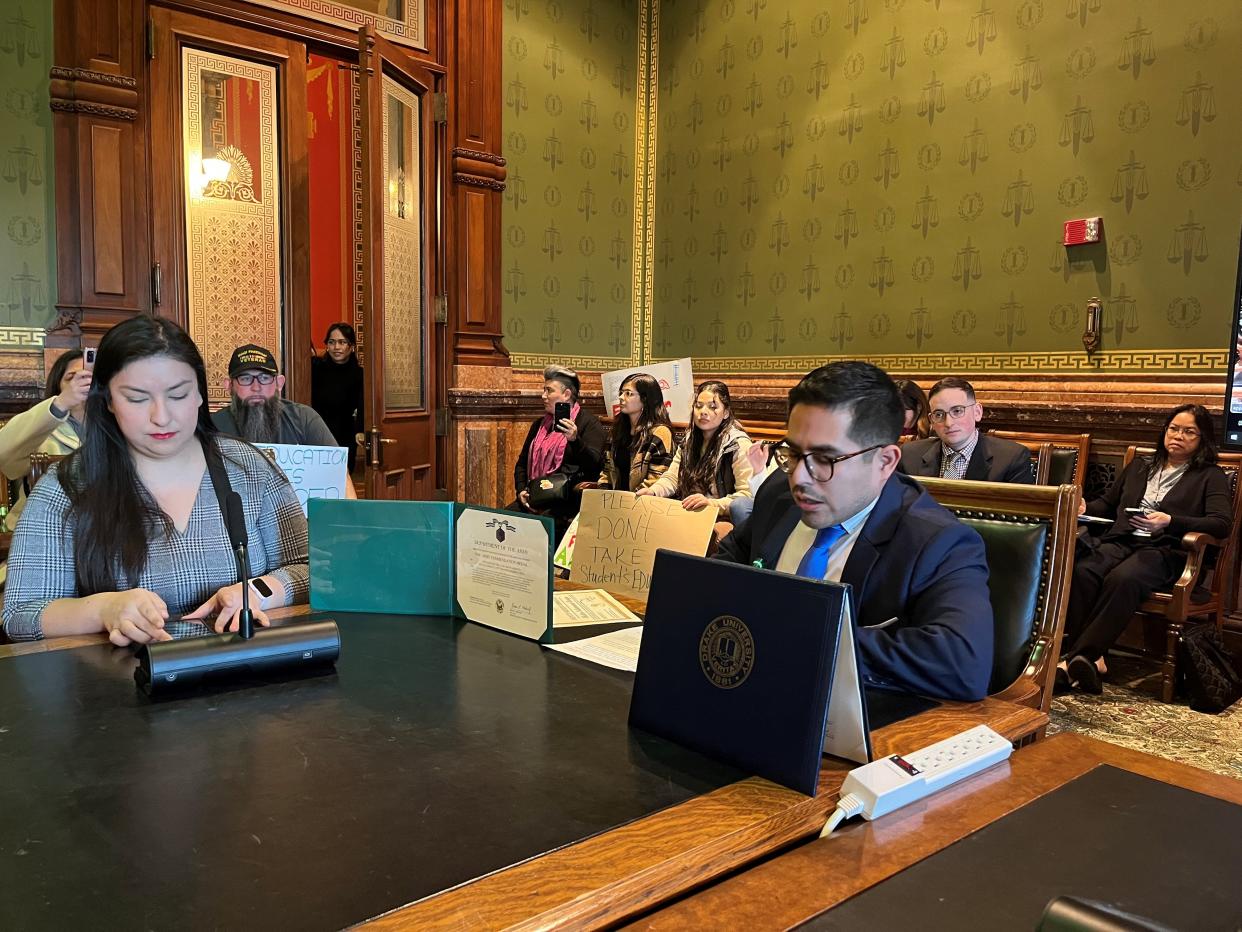Iowa doesn't require US citizenship for in-state tuition. A Republican bill would end that.

Hector Salamanca Arroyo placed his Drake University diploma on the table in front of him and told lawmakers he remembers nervously stressing about whether he would qualify for in-state tuition as an 18-year-old more than a decade ago.
Arroyo, who was undocumented at the time, did receive in-state tuition and studied criminal justice at Des Moines Area Community College before transferring to Drake, where he graduated with honors in 2015. Qualifying for the Deferred Action for Childhood Arrivals program allowed him to work legally in the country so he could pay for his education, he said.
"My educational journey all started by qualifying for in-state tuition," he said.
Arroyo was speaking out Monday against a bill in the Iowa House that would ban undocumented students from qualifying for in-state tuition at Iowa's three public universities and 15 community colleges.
House File 2128 would require Iowa's regents universities and community colleges to adopt rules specifying that students must be either U.S. citizens or lawfully present in the country to receive in-state tuition.
A House subcommittee voted 2-1 Monday afternoon to advance the bill, sending it to the full House Judiciary Committee for consideration. Reps. Taylor Collins, R-Mediapolis, and Skyler Wheeler, R-Hull, voted in favor, while Rep. Sami Scheetz, D-Cedar Rapids, opposed it.
"This is a very simple issue," Collins said. "If you come to this country illegally, we are not going to subsidize your college education."
Several Iowans spoke against the bill at Monday's subcommittee.
Arroyo, who became a U.S. citizen while deployed overseas with the Colorado Army National Guard, asked lawmakers to vote no "and uphold our proud Iowa tradition of educational access for all."
"Whether you acknowledge it or not, these are Iowans who aspire to further their education in their home state," he said. "Iowans who aspire to be future Cyclones, Panthers and Hawks in the same way as I did in 2012. They deserve to be treated as Iowans and qualify for in-state tuition."
Ariana Davis, of Des Moines, said she came to the United States from Mexico when she was 3. She studied at DMACC before receiving a bachelor's degree in criminal justice from Iowa State University.
It was her in-state tuition, as well as scholarships and DACA status, that allowed her to afford to pay for her education out of pocket.
"This dress that I’m wearing, I wore it when I became a United States citizen two years ago," Davis told lawmakers. "But I can assure that I’ve been an American since I was 3 years old. I am here to defend the pursuit of happiness for other Americans who are lacking the legal status of Americans but are American in every single other way."
No one spoke in favor of the bill Monday.
How much is in-state tuition in Iowa? How is it determined?
A year of in-state tuition at the University of Iowa is $9,016 in the 2023-24 school year, while nonresident tuition is $30,979.
At Iowa State University, one year of in-state tuition this year is $8,982, while nonresident tuition is $26,168.
At the University of Northern Iowa, in-state students pay $8,396 per year in tuition, while nonresident students pay $19,940.
Keith Saunders, a lobbyist for the Iowa Board of Regents, told lawmakers eligibility for in-state tuition is determined by residency in Iowa, not citizenship.
"If you graduate from an Iowa high school, you are presumed to be a resident of the state and deserving of in-state tuition," he said. "If you’re not a resident, there is a presumption that you’re an out-of-state student."
The Board of Regents is registered as undecided on the bill, but Saunders asked lawmakers not to require the state's public universities to set up additional bureaucracy on campus to collect proof of citizenship from students and to judge whether students' documents are genuine.
Des Moines Area Community College's website says undocumented students and DACA recipients qualify for in-state tuition as long as they have lived in Iowa for 90 days, attended and graduated from an Iowa high school and can submit a high school transcript providing evidence of attendance.
Scheetz said lawmakers should be focusing on more pressing issues related to higher education, such as the level of financial support the state provides to its public universities and rising costs for students.
"We don’t need the regents in the state of Iowa turning into our immigration services, having to check every single applicant to regent universities to see whether they’re citizens," he said.
Stephen Gruber-Miller covers the Iowa Statehouse and politics for the Register. He can be reached by email at sgrubermil@registermedia.com or by phone at 515-284-8169. Follow him on Twitter at @sgrubermiller.
This article originally appeared on Des Moines Register: Iowa lawmakers advance bill requiring citizenship for in-state tuition

